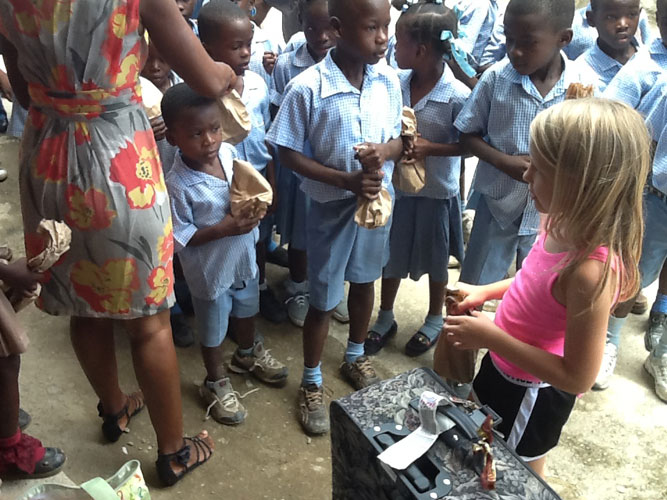SEBASTIAN — As 9-year-old Emerson “Emmie” Ann Maschhoff walked through the gritty, hot streets of Haiti two weeks ago, only one thing displayed more shock and awe than her own expression – the eyes of orphaned children who had never in their lives seen a blue-eyed blonde child.
“I got a little bit scared,” said Emmie about her journey to help bring humanitarian aid to the Potter’s Hand Orphanage in the village of Pilate on the northern tip of Haiti nearly 140 miles from the capital of Port au Prince.
She knew her father was planning another missionary trip so, last Christmas, instead of the latest fashion or electronic gadgets, Emmie asked Santa Claus for passage to Haiti to be part of the aid team.
“It was the number one thing on her list to Santa,” said her mother, Caroline Maschhoff, who stayed behind to care for son, Grant, and daughter, Antania.
Emmie got her Christmas wish, and was greeted by a swelling crowd of tiny onlookers pressed forward in hope of touching her skin and hair, or catching a closer glimpse of her brightly colored toenails, a luxury unfathomable to them.
With suitcase still in hand, Emmie handed out small care packages in brown paper sacks to the children.
First one child would approach, giggle, and run off to tell others, and before long it was tough to move forward, even under the protection of her father, aunt and paternal grandparents.
“They definitely don’t have the same need for personal space as we do,” said Ryan Maschhoff, associate pastor of United Church of Sebastian, a United Church of Christ church that informally organized the trip.
Efforts are focused on strengthening the Potter’s Hand orphanage, as Pilate is a site of perpetual recovery from poverty as well as cyclones, hurricanes, tropical storms, torrential rains, floods and earthquakes.
The small group visit represents a change in approach from the traditional missionary mindset of “the more the merrier,” Maschhoff said.
Traditionally, a mission trip is open to all who can afford passage, with volunteers performing skilled or unskilled labor on construction or feeding projects, including vital water purification.
Resources can be more efficiently applied, Maschhoff said.
“It doesn’t take many bodies to run up a $10,000 bill just in transportation,” Maschhoff said.
“That money is better spent on supplies sent over by a smaller number of travelers to act more as coordinators than volunteer laborers,” said Maschhoff, who learned of the new approach from a nursing coworker at Lawnwood Regional Medical Center in Ft. Pierce.
Nurse and Haiti expatriate Rose Vitale founded Potter’s Hand and works through relatives and supporters on both sides of the watery divide to develop it.
“Haitians need to save Haiti,” Vitale said.
She advocates sharing technology, supplies and funds, but believes it is crucial to inspire Haitians to perform the work to save themselves, lest they simply continue to stay weak and dependent on those who mistakenly think they can save others.
It is easy to give in to the temptation of doing work for others who need to do it for themselves, Maschhoff said.
“There is such a need there that you cannot imagine it unless you see it,” Maschhoff said. “The orphanages are always full, yet more infants are continually brought in. The places cannot take in more, lest the ones they are helping die as well, and then no one will be helped. There are no social services, so if there is no room, the child fades back into the jungle to die or worse.”
This heartbreak has inspired many missionaries and traveling volunteers to spend vast sums of money trying to save just one of these innumerable babies at a time, through adoption and U.S. immigration, he said.
“Again, this costs $30,000 to $50,000 per child, and that money can be much better spent on something as simple as baby formula, of which none exists there,” Maschhoff said. “If you can send the overflow of babies away with a supply of formula, they at least have a chance.”
During the Maschhoff’s visit, a tiny infant was brought in because a mother died of an asthma attack. Lack of funds for simple medicines creates more orphans each day.
“We were able to feed the baby right away, show their family members how to prepare formula in bottles and send them away with a supply.”
The Maschhoffs have made small group visits in recent years to provide water purifiers, without which Haitians die of drinking from the same water supply used for bathing and toileting.
The first small purifier could supply the orphanage, and then news of it spread until families and children brought containers as small as their cupped hands for a share of it.
The church later funded a larger water purifier as a business opportunity.
It could produce a supply abundant enough to sell and create a resource stream from those who can afford to pay, and a way for Haitians to help Haitians who cannot pay.
One thing a trip to Haiti does do, Maschhoff says, is infuse the traveler with a deep-seated mission to make a difference there because of what that person sees and experiences for himself.
It sets off a desperate attempt to make it better, else it is very difficult to take pleasure in the abundance enjoyed just a few hundred miles to the West.
During the trip, Emmie climbed down to the community riverbed surrounded by the protection of her family members.
There, other families washed the few stitches of clothing they possessed.
“It definitely made me feel like we have a lot of stuff and they don’t,” she said.
Upon her return to Liberty Magnet Elementary School last week, Emmie was presented an end-of-year award for living out the continent-crossing values of the school’s International Baccalaureate curriculum.

